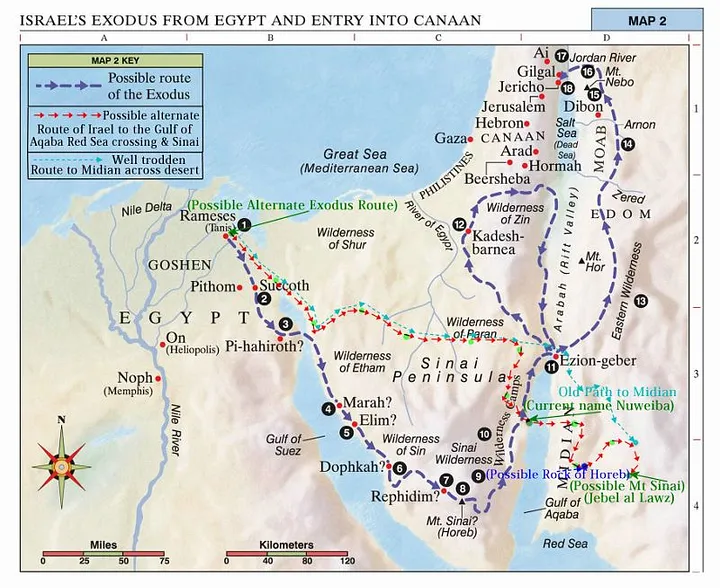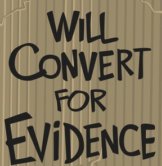Ten Reasons Why the Bible's Story of the Exodus is Not True
And why it really matters.
Tim Zeak: Published in ExCommunications
Oct 26, 2020

The story of the Exodus, in conjunction with others in the first five Books of the Old Testament,
often referred to as the Books of Moses, the Torah or the Pentateuch, has been the
foundation for three major religions and some minor ones. History has many examples of
nations, cities, ethnic groups and even families who proclaim their origin based on a
mythological story or a highly exaggerated one. These "founding stories" seek to unify
and exalt their group. Such stories in no way make the reality of their existence illegitimate.
Many quotes and links from Jewish Rabbis and Israeli archeologists and historians will be
cited throughout this article. There are some Biblical literalists (both Jewish and Christian)
who maintain that the Exodus took place exactly as the Bible states. Their main argument is
that the lack of archaeological and historical evidence does not rule it out. However, as
we will see, most experts and scholars dismiss the story as mythology. While some of them
still maintain a faith in God, they interpret their origin story as a metaphor or presentation,
just as many Christians, who acknowledge the fact of evolution and contradictions in the Bible,
view them as being far less important than "the greater truth." They say it is the power
of the sweeping epic that lies in its profound and timeless message about freedom and
not whether it is based upon literal historical facts.
Rabbi David Wolpe, Sinai Temple's senior rabbi interviewed By the Los Angeles Times, said:
"The truth is that virtually every modern archeologist who has investigated the story of
the Exodus, with very few exceptions, agrees that the way the Bible describes the Exodus is
not the way it happened, if it happened at all."
Rabbi Lawrence Hoffman, the distinguished professor of liturgy at Hebrew Union College, in
his article titled "The Bible is Fiction," did not discuss history or archeology, but argued
more broadly that the Books of Moses are fiction because their authors meant it not as
science or history but as presentation.
William Dever, a convert to Judaism, and a professor of Near Eastern archeology and anthropology
at the University of Arizona and one of America's preeminent archeologists argued that
"the Exodus story was produced for theological reasons: to give an origin and history to a
people and distinguish them from others by claiming a divine destiny."
Even if we ignore all these scholars and experts, there are many reasons why the very
words of the Biblical account itself make the story of the Exodus implausible.
-
No evidence in history or in the ground:
The story of the Exodus only appears in the Hebrew Bible/the Christian Old Testament and
nowhere else. Not in Egyptian history, nor in any other history. Despite decades of
extensive archaeological endeavors, not one trace of it has ever been found. This story
describes over two million people escaping from Egypt and spending 40 years in the
wilderness. That is more than twice the population of Jerusalem today. Almost all
archaeologists, including those in Israel, acknowledge that it could not have possibly happened
without significant evidence being left behind; yet not a trace has ever been found, even
after numerous and extensive attempts to prove the historicity of this event.
In fact, according to the books of Exodus and Numbers, an estimated 2,500,000 people
moved and set up their camp 42 times during those 40 years, giving archaeologists many large
areas to search. The only things they found were small ancient villages (and even a
deeply buried riverbed lined with stones), but nothing from the 42 largest and most
populated "cities" that the Bible claims were in the same area. Every one of those areas
would have left millions of animal bones from the daily sacrifices, cemeteries each having
tens of thousands of burials, and a sundry of other things including remnants of their numerous
fires. Ground-penetrating radar can often reach a depth of 50 feet. Not only are artifacts
best preserved in dry deserts, but all known high-tech instruments were used.
Written history records much in that area for over 15 centuries before this event was
said to have occurred. Surely, news would have quickly spread throughout the entire area
about the mighty military of Egypt being destroyed by runaway slaves and many accounts of
it would have been recorded. Yet, no account of it has ever been found. What history
does record is that the mighty military of Egypt not only was not destroyed, but that
they controlled the area of Canaan, the place where it is said the slaves escaped to,
during that time and long afterwards.
- An implausible start: The Bible tells us that all two million plus of them were
informed that the very next day, they would be escaping from Egypt and had to immediately
get prepared. (see Exodus 11:2-4 and Exodus 12:21-24)
In one day, over two million people, in Egypt, a very large county with no telephones
or radios, were all contacted and instructed to collect treasure from their masters
and then to kill a one-year old male lamb and smear its blood on the door posts of
their house that night. Obviously, these slaves were apparently wealthy, as they all
had houses with doors and a sizable herd of sheep so that each family was able to
pull an unblemished, one-year old male lamb from it. In a normal flock of sheep, about
20% are one year old...half of those would be males.
- A really long line: Two and a half million people would have created a line well over
200 miles long (at eight abreast with only three feet between each row) along with their
animals, of which the Bible says they had many. They also took along much treasure.
Many would have been with babies, pregnant, crippled, blind, or bedridden,
and yet a line of people extending over 200 miles long were able to outrun the Egyptian
army who were chasing them with chariots and horses, all in a single day and night.
Orthodox Jewish scholar Lawrence Schiffman, chairman of Hebrew and Judaic studies at
New York University, said, "you'd have to be a bit crazy to accept that figure" when
asked about the number of escaped slaves recorded in the Torah.

This is 100,000 people packed. Not 2,500,000 with children and animals being
chased by a powerful army. Image by Metrotimes
- A load beyond measure: Despite the Bible saying elsewhere that they only took
food wrapped in their shoulder sleeves and some treasure they obtained from the Egyptians,
we see soon after this one day escape that they all had tents to live in, along
with tools and weapons. They also had plenty of wood for the many required
daily sacrifices that their God demanded. We see in Exodus 29:25
"You shall take them from their hands, and offer them up in smoke on the altar
on the burnt offering for a soothing aroma before the Lord; it is an offering
by fire to the Lord." God loved the sweet soothing aroma of the burning animals after
they were just slaughtered as it floated up to His dwelling place; which is described
elsewhere as actually being the floor of the sky (firmament) where the rain and snow are stored.
Exodus chapters 35 and 39 describe numerous other items they had to have in order to
build the tabernacle which was built in the center of each camp including such things
as 48 15-foot solid beams overlaid with gold, and dozens of other items. Where did all
of these things come from? Numbers Chapter 7 states they had six carts pulled by oxen
that moved those items from camp to camp.
- Unrealistic hygiene requirements: Deuteronomy 23:12-14 says,
"You shall also have a place outside the camp and go out there, and you shall have
a spade among your tools, and it shall be when you sit down outside,
you shall dig with it and shall turn to cover up your excrement. Since the
Lord your God walks in the midst of your camp to deliver you and to defeat your enemies
before you, therefore your camp must be holy; and He must not see anything indecent among
you or He will turn away from you."
For those living near the center of camp, it would probably require a couple of miles
each way, given the estimate of the population, animals and bare-bone infrastructure.
Below is a refugee camp with tents. To house the 2,500,000 people, they would have needed
around 625,000 of them with no restroom facilities inside its perimeter.


Images by Sadik Gulecat Shutterstock and Washington Times of just several thousand tents, not 625,000
- Moses did not write any of the Torah: It is very easy to confirm and to understand
why the overwhelming majority of Biblical scholars today have determined that the
"Books of Moses," the first five books in the Old Testament, were not written until during
or after the post-exilic period (later than 586 B.C.E.) and absolutely not by Moses,
who would have died many centuries before... that is, had he been a real person.
History records thousands of individuals during more than 15 centuries before Moses was
supposed to have lived, but not one word about him anywhere even though he is said to have
defeated the Egyptian military and performed dozens of incredible miracles. There are no
historical records about Abraham, Isaac or Jacob either.
In his book this year, The Bible Unearthed, Israeli archeologist Israel Finklestein of
Tel Aviv University and archeological journalist Neil Asher Silberman raised similar doubts and
offered a new theory about the roots of the Exodus story. The authors argue it was
written centuries after the alleged events as a political manifesto to unite the Israelites.
Just a few reasons why a Moses authorship is readily dismissed are:
- A. In Deuteronomy 31:9 and elsewhere Moses is referred to in the third person.
That is an indication that someone else is narrating the deeds of Moses.
- B. Nowhere does it ever claim to be written by Moses.
- C. Number 12:3 states, "Now the man Moses was very humble, more than any man who
was on the face of the earth." By definition, a truly humble person would never admit it.
- D. It records details of Moses' death.
- E. Several statements such as "before any king ruled over the sons of Israel"
in Genesis 36:31 implies a time in the writers mind when kings had ruled over the
Israelites, but none did until centuries after Moses would have died.
- F. Scholars believe that there are multiple writers/editors to the first five books.
The fact that Moses's father-in-law is sometimes called Jethro and other times Reuel
is just one of many examples.
- G. See Number 7 below regarding anachronisms.
- There are many anachronisms: Many locations named in this story were not even
in existence at that alleged time, clearly proving the story was developed at a
much later time than it claims to be. This is called an anachronism, one of several factors
that scholars use in dating old manuscripts. An example would be a story claiming to
be written at the time of George Washington but referencing a city named Seattle or
referring to things such as radios. That would be proof positive that the author was not
telling the truth about when it was being composed.
Moreover, specialists in the Hebrew Bible say that the Exodus story is riddled with
internal contradictions stemming from the fact that it was spliced together from
several texts written at different times. One passage in Exodus, for instance,
says that the bodies of the pharaoh's charioteers were found on the shore, while the
next verse says they sank to the bottom of the sea.
Another is that the Edomite kings listed in Genesis 36 did not live until a
time well after Moses would have died. For more detail, see Book of Joshua.
- What would it take infrastructure wise for a community of 2,500,000 to function?
After 40 years in the wilderness, Joshua and Caleb were the only two still alive
from the original 2,500,000 who escaped. The Bible indicates that the population after the
40 years was nearly the same. (603,500 before vs 601,730 after the 40 years of men over
20 years old who were able to go to war).
This problem needs little if any comment. Water distribution in the desert would require
an amazing network of wells, cisterns, and piping, assuming you can find the water to
begin with. Since their food was rained down for them as manna, we can skip that
necessity. Sanitation would be huge, manufacturing of clothes for those born in the
wilderness, hospitals, first aid stations, schools, day care, where to gather wood
for the many daily sacrifices (in the desert), medicines, soap, blankets or sleeping
bags for those cold nights, and countless other needs that cannot be ignored. Factories
and mining facilities were needed as they all had spades, tools, and weapons.
Let us not forget the necessary streets or walkways, pastures and barns, food for the
animals and storage for their feed, to name just a couple more. And all of that infrastructure
had to be built or reassembled 42 times as Exodus 40:36-37 states "Throughout all
their journeys whenever the cloud was taken up from over the tabernacle, the sons of Israel
would set out; but if the cloud was not taken up, then they did not set out until the day
when it was taken up."
Remember that photo of a few thousand tents in a refuge camp. Again, around 625,000 would be
needed. (if a family averaged four people...the same factor often used to arrive at the
estimated total of 2,500,000)
- Can the earth ever stop spinning? As a climax to the Exodus was the alleged conquest
of Canaan. The Bible claims that God literally stopped the sun for 24 hours so that
Joshua could defeat the enemy while there was still light. Physics is clear; if the
earth abruptly stopped spinning for even a second, all people, animals, rocks, topsoil,
trees, buildings, and so on, would be swept away into the atmosphere. No where in the world
is there any record of this long day.
- Parallels of earlier known writings: Mythological stories are usually built around
superheroes. The story of the Exodus was written during the Babylonian captivity where most
of the Jewish captives assimilated into its culture. Many did not return when King Cyrus
decreed them the right to. The fact is, many liked it there and were well settled and
comfortable. What were the priests to do?
One of the most famous kings known to that history was the Akkadian King Sargon. He was
called Sargon the Great who conquered among other places, Mesopotamia and the Levant.
He established the first real empire. He was well known in Babylonian literature and was a
famous legend due to his birth story and great leadership. Note how the writers gave Moses
those same attributes. Here is a brief account of his Sargon's birth and deeds:
The following worn translation of the legend comes from J.B. Pritchard's
The Ancient Near East Volume I, pages 85-86. It reads: (The legend of Sargon)
Sargon, the mighty king, king of Agade, am I.
My mother was a changeling, my father I knew not.
The brother(s) of my father loved the hills.
My city is Azupiranu, which is situated on the banks of the Euphrates.
My changeling mother conceived me, in secret she bore me.
She set me in a basket of rushes, with bitumen she sealed
My lid.
She cast me into the river which rose not (over) me,
The river bore me up and carried me to Akki, the
drawer of water.
Akki, the drawer of water lifted me out as he dipped his e[w]er.
Akki, the drawer of water, [took me] as his son
(and) reared me.
Akki, the drawer of water, appointed me as his gardener,
While I was a gardener, Ishtar granted me (her) love,
And for four and [ ... ] years I exercised kingship,
The black-headed [people] I ruled, I gov[erned];
Mighty [moun]tains with chip-axes of bronze I conquered,
The upper ranges I scaled,
The lower ranges I [trav]ersed,
The sea [lan]ds three times I circled.
Dilmun my [hand] cap[tured],
[To] the great Der I [went up], I [. . . ],
[ . . . ] I altered and [. . .].
We now understand why the writers of these five books developed its main character,
Moses, into someone the people could identify as being a great superhero. The same birth
story as Sargon's along with many miraculous stories and fearful commandments saying that
if they followed this God, all would be wonderful, but if not, there would be nothing
but dreadful pain. The writers had an extremely hard task in motivating the people to
return and become unified and this story of their alleged origin was key.
The writers knew that if there was going to be a unified people, a people who were
enjoying the safety of another culture and other gods; they would have to be separated
from "the snares of the world," so the "carrot and stick" approach was utilized.
In fact, this separation was key in the opinion of the writers for we read in
Ezra 10:2-4, at the time many of the captives were returning, "... We have been
unfaithful to our God and have married foreign women from the peoples of the land;
yet now there is hope for Israel in spite of this. So now let us make a covenant
with our God to put away all the wives and their children, according to the counsel
of my lord and of those who tremble at the commandment of our God; and let it be
done according to the law. Arise! For this matter is your responsibility, but we
will be with you; be courageous and act."
Separation was more important than their faithfulness and loyalty to their wives and very own children.
This story included many acts of genocide to accomplish two main goals: the obtaining
of sacred land areas, and as the Bible says, to free them from being tempted by foreign women and gods.
We conclude with several more quotes from Rabbis and Jewish scholars:
Again, from William Dever, the professor of Near Eastern archeology and anthropology at the
University of Arizona said; "The Exodus story was produced for theological reasons: to
give an origin and history to a people and distinguish them from others by claiming a divine destiny."
Ze'ev Herzog continued, "Scholars have known these things for a long time, but we've
broken the news very gently, the old emphasis on trying to prove the Bible has given way
to more objective professionals aiming to piece together the reality of ancient lifestyles."
"Among Reform, Conservative and Reconstructionist Jews, there is a much greater
willingness to see the Torah as an extended metaphor in which truth comes through story
and law," said Rabbi Bradley Shavit Artson, dean of the Ziegler School of Rabbinic Studies
at the University of Judaism in Los Angeles.
The first mention of Israel in recorded history is ironic. It was engraved by the
Egyptian Pharaoh on the famous Merneptah Stele dated to 1205 B.C.E., about
two centuries after Israel would have been well settled in Canaan.
The princes are prostrate, saying, "Peace!"
Not one is raising his head among the Nine Bows.
Now that Tehenu (Libya) has come to ruin,
Hatti is pacified;
The Canaan has been plundered into every sort of woe:
Ashkelon has been overcome;
Gezer has been captured;
Yano'am is made non-existent.
Israel is laid waste and his seed is not;
Hurru is become a widow because of Egypt.
Not one trace of evidence after decades of diligent investigation with the most
advanced technological tools.
Not one word in Egypt's history recording anything connected with the Bible's account.
And not one word from any other surrounding nations or states (or private historian)
who would have gladly published the destruction of a mighty army by runaway slaves.
That is why few scholars will defend the Bible's account of it.
This is just one example that clearly proves that the Bible was not inspired by a good
and perfect God... it was written by human hands, with human motives. Maybe one day,
hopefully soon, the Israelis and Palestinians can live in peace, prosperity, and
harmony, as people of good will celebrating their remarkably close ancestry and in
a land large enough for all of them.
|



 hjw2001@gmail.com
hjw2001@gmail.com























